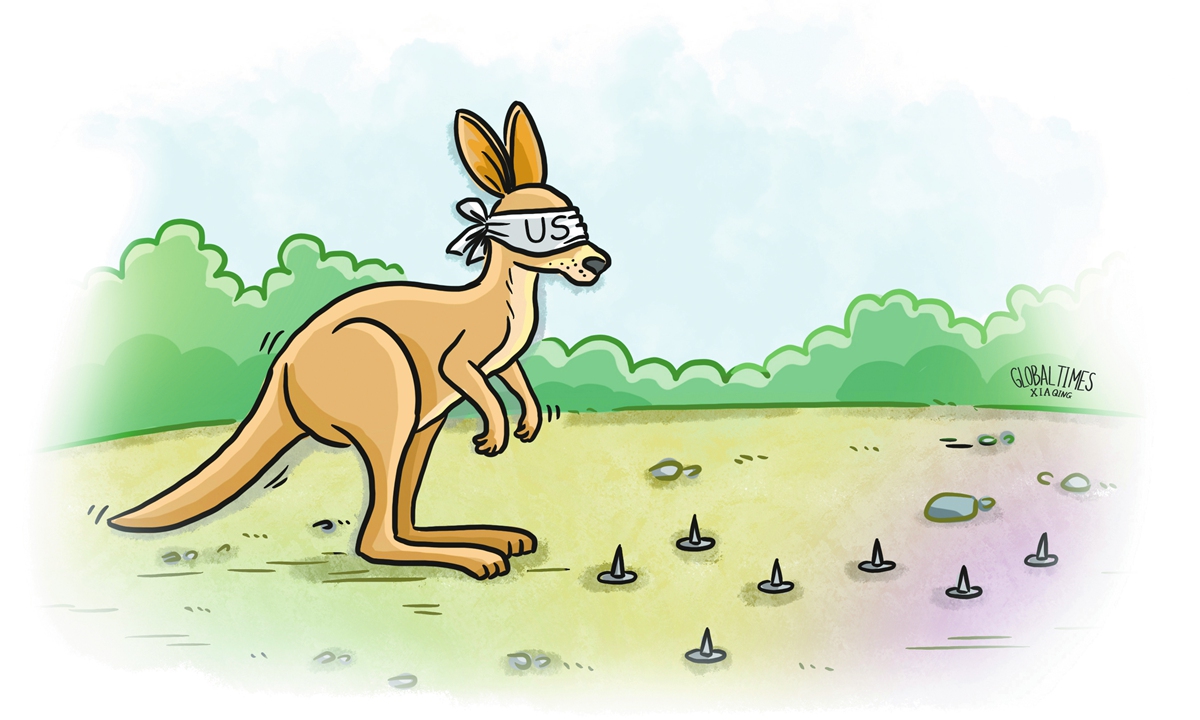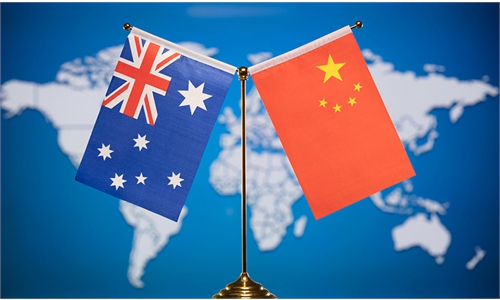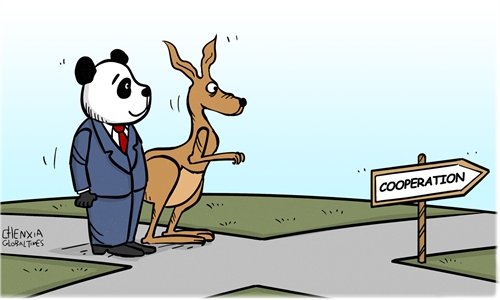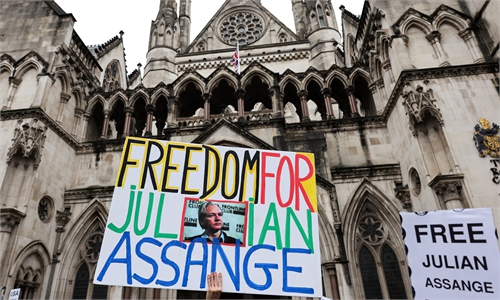
Illustration: Xia Qing/GT
The China-Australia bilateral relationship has trilateral characteristics. The Australian subimperial reflex casts a long shadow over the nation's policy posture and attitude toward China.
No doubt, this reflex will be activated and calibrated at the August 6 meeting between the foreign and defence ministers/secretaries of the US and Australia, as part of the annual Australia-US Ministerial Consultation (AUSMIN).
As a subimperial power, Australia's policy establishment not only draws succour from the protective umbrella of historic allegiances with a great transatlantic protector, but frames its own national interests through the lens of the interests of its protector. This frame is now under stress, as the world in which it operates is changing in ways that challenge the relevance of the frame itself, as well as the actions that are caused by the subimperial reflex.
Eminent historian David Walker once documented Australia's relationship with China and Asia during the late 1800s and early 1900s, describing the country as an "anxious nation." More recently, the late doyen of Australian foreign policy Allan Gyngell described the nation's "fear of abandonment" to explain the shackles that restrict the policy imagination of the policy establishment generation after generation. These two dispositions bookend the parameters of what I call the "agency envelope," which shapes the possibilities of Australian foreign and security policy.
When American primacy in Asia was unquestioned, the Australian policy establishment could be comforted by Australia's subimperial status, and so whatever was good for the US was also good for Australia. The AUSMIN meetings are parts of the intertwined institutional fabric that undergirds this alignment.
But American primacy in the region is no more.
The US' post-WWII military preponderance globally - and in Asia - has been dealt an era-ending blow by the defeats in Afghanistan, the unfolding debacle in Ukraine and the failure to bring either Hamas or the Houthis of Yemen to heel.
American equipment, munitions and military technologies have been exposed for their battlefield limitations. Western (NATO) doctrine has been found wanting in a war against a peer adversary. The collective Western military supply chains have been shown to be insufficient in repair and replace capabilities. The sanctions war against Russia only strengthened the Russian economy, and indirectly contributed to the consolidation of the Eurasian economic mass.
These are realities that have only recently, and reluctantly, been recognized in Washington and elsewhere in the collective West. The Congressional Commission on the National Defense Strategy released its report at the end of July, concluding that the US is unlikely to effectively prevail in a major conflict. The report observed that: "Unclassified public wargames suggest that, in a conflict with China, the United States would largely exhaust its munitions inventories in as few as three to four weeks, with some important munitions, for example anti-ship missiles, lasting only a few days. Once expended, replacing these munitions would take years."
Attempts by the US to shore up its Pacific footprint must be understood in this context. China is seen as the adversary. The US has been building a new network of China containment by inveigling subimperial allies, post-war client states and former colonies in an array of minilateral arrangements. Australia is party to two: Quad and AUKUS.
The rationale for participating in these minilaterals remains unclear and often unsubstantiated. The mainstream defense establishment speaks of a need to strengthen forward defense in an environment of heightened uncertainty and volatility. Without naming China, such talk of forward defense by means of a US-designed containment strategy clearly presupposes China as the "security risk par excellence."
Nowhere has anyone demonstrated that China poses a risk to Australia's territorial integrity. Australia's economic welfare is built on trade with China; it's not a risk, it's a bonus. How China poses a risk to Australia's "way of life" is implied through whispers and innuendo, with pseudo-McCarthyist campaigns flagging "espionage" and "interference." Are Australian cyber-defenses and institutions of state so fragile that they cannot cope with these kinds of "threats"?
Put plainly, China may be the enemy in America's eyes, but there's no demonstration from the Australian establishment to show that China is Australia's enemy.
America's pursuit of revitalized Asian primacy presupposes the contribution of its allies in the region. The Congressional Commission report, however, suggests that ambition is unlikely to be matched by reality. The de facto expansion of NATO into Asia hasn't been met with open arms from regional actors. It threatens ASEAN centrality, which may be consistent with the US' long-held strategy toward the region. However, it goes against the interests of multilateral peace-making in the region.
The subimperial reflex eases Australia's various anxieties, but it is inconsistent with both the material demise of American preponderance and the institutional dynamics of Asia in general.
ASEAN centrality and American primacy are contradictions in terms.
If Australia seeks security within Asia, it will need to find a path to empower and engage with ASEAN centrality meaningfully. However, if it wants to seek comfort in security from Asia, then it will follow the US down the Asian primrose path, and the risk for Australia is that it will find itself completely isolated in the region.
The author is adjunct professor at Queensland University of Technology; senior fellow at Taihe Institute. opinion@globaltimes.com.cn



